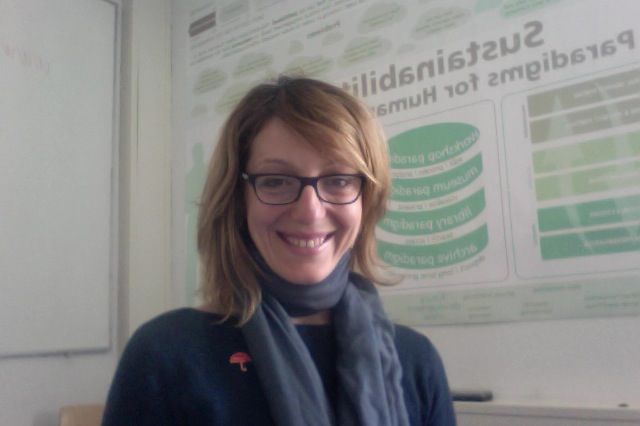Studying at the University of Verona
Here you can find information on the organisational aspects of the Programme, lecture timetables, learning activities and useful contact details for your time at the University, from enrolment to graduation.
Academic calendar
The academic calendar shows the deadlines and scheduled events that are relevant to students, teaching and technical-administrative staff of the University. Public holidays and University closures are also indicated. The academic year normally begins on 1 October each year and ends on 30 September of the following year.
Course calendar
The Academic Calendar sets out the degree programme lecture and exam timetables, as well as the relevant university closure dates..
| Period | From | To |
|---|---|---|
| I semestre | Oct 1, 2018 | Jan 12, 2019 |
| II semestre | Feb 18, 2019 | Jun 1, 2019 |
| Session | From | To |
|---|---|---|
| ESAMI LINGUE- sessione invernale | Jan 14, 2019 | Feb 16, 2019 |
| ESAMI LINGUE- sessione estiva | Jun 3, 2019 | Jul 27, 2019 |
| ESAMI LINGUE- sessione autunnale | Aug 26, 2019 | Sep 21, 2019 |
| Session | From | To |
|---|---|---|
| LAUREE LINGUE - sessione autunnale (a.a. 2017/18) | Nov 12, 2018 | Nov 17, 2018 |
| LAUREE LINGUE - sessione straordinaria (a.a. 2017/18) | Apr 1, 2019 | Apr 6, 2019 |
| LAUREE LINGUE - sessione estiva (a.a. 2018/19) | Jul 8, 2019 | Jul 13, 2019 |
| LAUREE LINGUE - sessione autunnale (a.a. 2018/19) | Nov 4, 2019 | Nov 9, 2019 |
| LAUREE LINGUE - sessione straordinaria (a.a. 2018/19) | Mar 30, 2020 | Apr 4, 2020 |
| Period | From | To |
|---|---|---|
| Festa di Ognissanti | Nov 1, 2018 | Nov 1, 2018 |
| Sospensione dell'attività didattica | Nov 2, 2018 | Nov 3, 2018 |
| Festa dell’Immacolata | Dec 8, 2018 | Dec 8, 2018 |
| VACANZE DI NATALE | Dec 22, 2018 | Jan 6, 2019 |
| VACANZE DI PASQUA | Apr 19, 2019 | Apr 23, 2019 |
| Sospensione dell'attività didattica | Apr 24, 2019 | Apr 24, 2019 |
| Festa della liberazione | Apr 25, 2019 | Apr 25, 2019 |
| Festa del lavoro | May 1, 2019 | May 1, 2019 |
| Sospensione dell'attività didattica | May 20, 2019 | May 20, 2019 |
| Festa del Santo Patrono | May 21, 2019 | May 21, 2019 |
| Festa della Repubblica | Jun 2, 2019 | Jun 2, 2019 |
| VACANZE ESTIVE | Aug 13, 2019 | Aug 18, 2019 |
Exam calendar
Exam dates and rounds are managed by the relevant Foreign Languages and Literatures Teaching and Student Services Unit.
To view all the exam sessions available, please use the Exam dashboard on ESSE3.
If you forgot your login details or have problems logging in, please contact the relevant IT HelpDesk, or check the login details recovery web page.
Academic staff
 alessandro.bigardi@univr.it
alessandro.bigardi@univr.it

Bradas Marija
 marija.bradas@univr.it
marija.bradas@univr.it
 paolamaria.caleffi@univr.it
paolamaria.caleffi@univr.it
 veronica.gobbato@univr.it
veronica.gobbato@univr.it
 tiziana.mancinelli@univr.it
tiziana.mancinelli@univr.it
 silvia.zollo@univr.it
silvia.zollo@univr.it
Study Plan
The Study Plan includes all modules, teaching and learning activities that each student will need to undertake during their time at the University.
Please select your Study Plan based on your enrollment year.
1° Year
| Modules | Credits | TAF | SSD |
|---|
1st foreign language2nd foreign literature1st foreign literature2nd foreign literature2° Year activated in the A.Y. 2019/2020
| Modules | Credits | TAF | SSD |
|---|
1st foreign language2nd foreign language1st foreign literature2nd foreign literature1 module to be chosen among the following3° Year activated in the A.Y. 2020/2021
| Modules | Credits | TAF | SSD |
|---|
1st foreign language2nd foreign languagePhilology of the 1st or 2nd language| Modules | Credits | TAF | SSD |
|---|
1st foreign language2nd foreign literature1st foreign literature2nd foreign literature| Modules | Credits | TAF | SSD |
|---|
1st foreign language2nd foreign language1st foreign literature2nd foreign literature1 module to be chosen among the following| Modules | Credits | TAF | SSD |
|---|
1st foreign language2nd foreign languagePhilology of the 1st or 2nd language| Modules | Credits | TAF | SSD |
|---|
Legend | Type of training activity (TTA)
TAF (Type of Educational Activity) All courses and activities are classified into different types of educational activities, indicated by a letter.
Introduction to Germanic Philology (2020/2021)
Teaching code
4S003493
Teacher
Coordinator
Credits
6
Language
Italian
Scientific Disciplinary Sector (SSD)
L-FIL-LET/15 - GERMANIC PHILOLOGY
Period
I semestre (Lingue e letterature straniere) dal Sep 28, 2020 al Jan 9, 2021.
Learning outcomes
The course is an Introduction to Germanic Philology; it aims at transmitting basic information on the multi-disciplinary topics of Germanic Philology, which encompass codicology and the history of books, paleography, textual criticism (including basic knowledge on digital editing of texts and manuscripts), and furthermore information on the cultural history of Germanic peoples and on historical-linguistic features of Germanic languages. Expected Outcomes - Basic knowledge of methods and cultural contents related to the literary traditions of Germanic languages - High level proficiency in the specialistic vocabulary related to every field of Germanic Philology - Basic knowledge of the different specialistic fields of Germanic philology, mainly focussing on the history of books in the Germanic Middle Ages (also treated with computer-assisted methods and procedures), in compliance with the general learning outcomes of the Bachelor Degree in Languages and Cultures for Publishing
Program
In summary, the programme will develop as follows:
1st part (= 5 weeks = 20 hours)
Historical linguistics (Germanic isoglosses); Germanic antiquities; vernacular manuscript traditions in Germanic language speaking areas: literary genres.
2nd part (= 4 weeks, = 16 hours)
Introduction to Old Norse literature and manuscript culture; A Bibliography of Snorri’s Edda
Teaching
Teaching modalities are different for attendees and non-attendees.
For attendees only: ongoing self-evaluation test (this will be scheduled during the course).
Throughout the entire academic year, the instructor is available weekly during her office hours (the schedule is available on this webpage and can be subject to variations), generally with no need to arrange an appointment, unless there are specific announcements on the personal page.
At the beginning of the course attendees will receive a complete schedule of the teaching activities (including class dates and place). Possible postponements of the classes will be announced via the e-learning platform.
Non-attendees are kindly requested to contact the instructor. Possible updates will be made available in good time also by means of dedicated posts on the e-learning platform (so everybody is supposed to subscribe to it).
Content of textbooks, as well as of classes and exercise held during the course comply with the programme. Further materials is available on the e-learning.
Further readings will be indicated during the course.
| Author | Title | Publishing house | Year | ISBN | Notes |
|---|---|---|---|---|---|
| Marco Cursi | 1 Le forme del libro : dalla tavoletta all’e-book | Il Mulino | 2016 | 9788815265173 | |
| Haugen, Odd Einar, et al. | Le lingue nordiche nel medioevo (vol. 1) | Novus Press | 2018 | 978-82-8390-002-6 | This book can be downloaded from http://omp.novus.no. |
| Christopher De Hamel | Storia di dodici manoscritti | Mondadori | 2017 | 9788804681809 | Tre manoscritti a scelta dello studente. / Three manuscripts of your choice. |
Examination Methods
Oral exams during the official exam sessions scheduled and published by the Department of Foreign Languages and Literatures. Assessment will include:
ATTENDEES--> ongoing evaluation test referring to the 1st part of the programme + oral exams on the other part of the programme
NON-ATTEDEES--> oral exam on the whole programme
Assessment In the middle of the course (after the 5th week), students can take a written test (preceded by a mock-test which will be corrected and discussed in the classroom with self-evaluation), aimed at evaluating the introductory parts of the programme (it will deal with the first 5 weeks of classes) and the corresponding bibliography. The oral exam will regard themes related both to the written test and to the 2nd part of the programme. Moreover, the oral exam will assess:
- depth and extent of acquired knowledge
- accuracy of acquired vocabulary
- ability to link aspects concerning both parts of the programme.
The intermediate written exam will be structured according sections related to the main themes of the course (1st part), with the support of learning materials which will be prepared ad hoc. The evaluation is expressed in 30/30. The written exam will be subject to an evaluation which the student will integrate with the oral exam. To foster the correct understanding of the contents and of the modalities of the pre-assessment written test during the classes the test of last year will be discussed (it is already available on the e-learning). The oral exam will be on the entire programme. The final evaluation is expressed in 30/30. Erasmus students are kindly requested to contact the instructor at the beginning of the course to arrange both learning and assessment methods and criteria.
Type D and Type F activities
To discover all the teaching activities accredited by the foreign teaching college click here
Career prospects
Module/Programme news
News for students
There you will find information, resources and services useful during your time at the University (Student’s exam record, your study plan on ESSE3, Distance Learning courses, university email account, office forms, administrative procedures, etc.). You can log into MyUnivr with your GIA login details: only in this way will you be able to receive notification of all the notices from your teachers and your secretariat via email and soon also via the Univr app.
Student login and resources
Assegnazione tutore
Attività accreditate D/F
Calendario didattico dettagliato
Cambio lingua curriculare
Competenze informatiche
Competenze linguistiche (prima e seconda lingua)
Competenze linguistiche in triennale (terza lingua CFU F)
Compilazione del piano didattico
Corso di Lingua portoghese
Erasmus+ e altre esperienze all'estero
Linguistic training CLA
Graduation
List of theses and work experience proposals
| Stage | Research area |
|---|---|
| PROGETTO MAMBRINO Stage per bibliografia | Various topics |
Stage e tirocini
Nel piano didattico della laurea triennale in Lingue e culture per l’editoria (L11 ED) è previsto un tirocinio/stage obbligatorio (CFU 6).
Le attività di stage sono finalizzate a far acquisire allo studente una conoscenza diretta in settori di particolare interesse per l’inserimento nel mondo del lavoro e per l’acquisizione di abilità professionali specifiche.
Le attività di stage sono svolte sotto la diretta responsabilità di un singolo docente presso studi professionali, enti della pubblica amministrazione, aziende accreditate dall’Ateneo veronese.
I crediti maturati in seguito ad attività di stage saranno attribuiti secondo quanto disposto nel dettaglio dal “Regolamento d’Ateneo per il riconoscimento dei crediti maturati negli stage universitari” vigente.
- Tutte le informazioni in merito agli stage per futuri studenti sono disponibili alla pagina Stage e tirocini.
- Tutte le informazioni in merito agli stage per studenti iscritti sono pubblicate in MyUnivr - come fare per - stage e tirocini.
- Tutte le informazioni in merito agli stage per le aziende sono disponili alla pagina Stage e tirocini per azienze.
Ulteriori informazioni al seguente link https://www.univr.it/it/i-nostri-servizi/gestione-carriere-studenti-lingue-e-letterature-straniere/stage-e-tirocini-lingue-e-letterature-straniere

 +39 045802 8409
+39 045802 8409






























